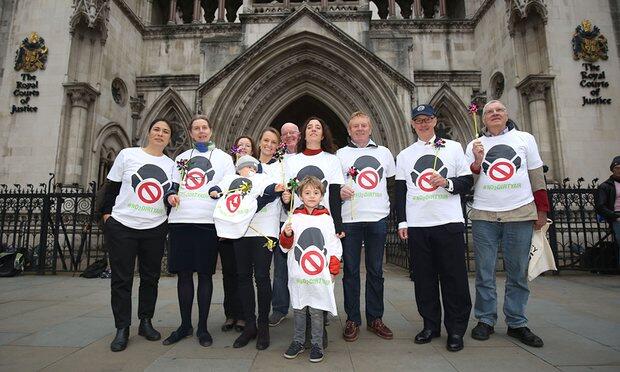The Treasury blocked other government departments from charging diesel cars to enter towns and cities blighted by air pollution, documents revealed during a high court hearing on Tuesday.
Legal NGO ClientEarth is challenging the government’s pollution plan, which by law should cut illegal levels of nitrogen dioxide in the “shortest possible time”. Air pollution causes 50,000 early deaths and £27.5bn in costs every year, according to the government’s own estimates, and was called a “public health emergency” by MPs in April.
It is the second time ClientEarth has sued the government over air pollution, which has broken EU legal limits since 2010 in many parts of the country.ClientEarth won in the supreme court in 2015 and ministers were ordered to draw up an action plan, but ClientEarth argues even the new plan is illegal and has gone back to court. Government lawyers will put forward their defence on Wednesday, with the judgment expected in the following weeks or months.
ClientEarth’s lawyers have used government documents released as part of the legal process to bolster their arguments. One document shows the environment and transport departments wanted diesel cars, a major source of pollution, included the government’s proposed Clean Air Zones. But the Treasury blocked the move, with officials arguing it “would be politically very difficult, especially given the impacts on motorists”.
Another political consideration was how quickly the EU would move to impose fines on the UK for illegally high air pollution. In developing the air quality plan, the environment secretary, then Liz Truss, had sought the “minimum” steps needed to avoid fines, with officials advising that “2020 is likely to be the earliest the EU will move to fines”.
ClientEarth argued that basing the target date for compliance on avoiding fines was arbitrary and did not meet the legal requirement to cut pollution in the shortest possible time.
The government documents reveal that a more ambitious air quality plan was considered, with the Department for the Environment, Food and Rural Affairs (Defra) stating in September 2015 that “the current plan represented the backstop option to tackle air quality which has already been pared back considerably”.
In May 2015, Defra officials had said a “most likely” scenario would include wider use of low-emission zones in around 16 cities around London rather than six, and a package of wider national measures to tackle issues outside city centres […such as] scrappage or tax measures.”
The government has proposed just five mandatory Clean Air Zones (CAZs) outside London – in Birmingham, Leeds, Southampton, Nottingham and Derby – and rejected a scrappage scheme for older, dirty vehicles. Both the environment and transport departments recommended changes to Vehicle Excise Duty rates to encourage the purchase of low-pollution vehicles, but the Treasury rejected the idea.
The government documents release show the chancellor, then George Osborne, was “very clear”: he favoured the introduction of mandatory CAZs and “nothing more”.
ClientEarth’s lawyers also argued that modelling used by the government to assess the impact of its pollution plans failed to account fully for the fact thatdiesel cars emit far more pollution on the road than in official lab-based tests. ClientEarth’s lawyers said the documents show the environment department’s officials were aware that their modelling was very optimistic. The existing data shows that 14-18 CAZs would have to be created to ensure pollution falls to legal levels by 2020, not five, according to ClientEarth.
ClientEarth lawyer Alan Andrews said: “George Osborne has some serious questions to answer. The Treasury’s approach in the face of the tragic toll of air pollution in this country was to oppose anything but the bare minimum as too expensive. But what makes [Osborne’s] behaviour even less understandable is that there is also a significant economic impact.” Andrews said action to cut air pollution would benefit the economy more than it costs.
ClientEarth is asking the court to order another new, more effective plan that could include a national network of CAZs and a retrofitting scheme for buses and HGVs.
“Every day that passes air pollution is damaging the lungs of children across the UK,” said Prof Jonathan Grigg, an expert on respiratory medicine and member of the Committee on the Medical Effects of Air Pollutants, which advises the government. “It is therefore not acceptable to hope that air pollution will fall at some point in the distant future. The government must act now to protect this generation of children.”
A government spokesperson said: “The government is firmly committed to improving the UK’s air quality and cutting harmful emissions. That’s why we have committed more than £2bn since 2011 to increase the uptake of ultra-low emissions vehicles, support greener transport schemes and set out a national plan to tackle pollution in our towns and cities. We cannot comment on ongoing legal proceedings.”
Source: The Guardian











